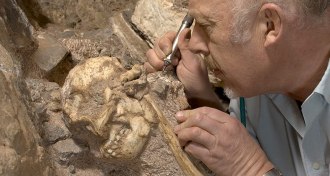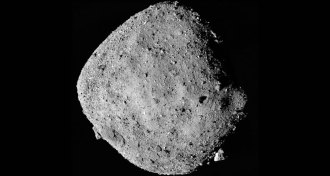News
-
 Archaeology
ArchaeologyCorn domestication took some unexpected twists and turns
A DNA study challenges the idea people fully tamed maize in Mexico before the plant spread.
By Bruce Bower -
 Plants
PlantsHybrid rice engineered with CRISPR can clone its seeds
New research has created self-cloning hybrid rice, raising hopes of higher food production.
By Susan Milius -
 Health & Medicine
Health & MedicineBabies born in opioid withdrawal have unusually small heads
Infants born dependent on opioids had heads that were smaller than babies whose moms didn’t use the drugs during pregnancy.
-
 Humans
Humans‘Little Foot’ skeleton analysis reignites debate over the hominid’s species
Long-awaited analyses of the Little Foot skeleton have researchers disagreeing over resurrecting a defunct species name.
By Bruce Bower -
 Earth
EarthHere’s what was surprising about Kilauea’s 3-month-long eruption
Researchers revealed new insight into the Hawaiian volcano’s most recent eruption.
-
 Tech
TechA new way to turn saltwater fresh can kill germs and avoid gunk buildup
A new device that harnesses sunlight to produce pure vapor from seawater could last longer and produce cleaner water than other technology.
-
 Climate
ClimateThe list of extreme weather caused by human-driven climate change grows
The tally of extreme weather events linked to climate change continues to grow, with new studies outlining links to more than a dozen events in 2017.
-
 Planetary Science
Planetary ScienceNASA’s OSIRIS-REx finds signs of water on the asteroid Bennu
NASA’s OSIRIS-REx spacecraft found signs of water and lots of boulders on the asteroid Bennu.
-
 Cosmology
CosmologyVoyager 2 spacecraft enters interstellar space
Voyager 2 just became the second probe ever to enter interstellar space, and the first with a working plasma instrument.
-
 Neuroscience
NeuroscienceThe uterus may play a role in memory
In lab tests, rats that underwent hysterectomies had worse spatial memories.
-
 Oceans
OceansVolcanic eruptions that depleted ocean oxygen may have set off the Great Dying
Massive eruptions from volcanoes spewing greenhouse gases 252 million years ago may have triggered Earth’s biggest mass extinction.
-
 Animals
AnimalsHere’s how geckos (almost) walk on water
New high-speed video reveals how geckos use a hybrid walking-swimming gait in water to reach speeds similar to those on land.